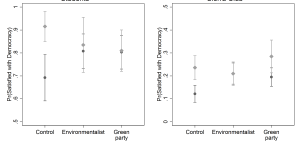My academic research career has been focussed on Political Behaviour. That is, mostly the study of the actions and choices of citizens in democracies. I've studied vote choice, referendum choice, media effects on voters, the formation of attitudes, judgments of governments under federalism, the effect of election polls on voters, survey design and survey modes, the effect of the number of parties on voters, and the factors influencing citizens' satisfaction with democracy.
Here's a list of publications, by theme, with abstracts:
(See my publications on ORCID here:  https://orcid.org/0000-0002-1136-004X)
https://orcid.org/0000-0002-1136-004X)
Vote Choice
Fournier, P. Fred Cutler, Stuart Soroka, Dietlind Stolle, Eric Belanger. “Riding the Orange Wave: Leadership, Values, Issues, and the 2011 Canadian Election,” Canadian Journal of Political Science. 46:4 (2013) DOI: 10.1017/S0008423913000875
The results of the 2011 Canadian federal election were surprising. What accounts for the dramatic and largely unexpected shift in electoral fortunes? Most importantly, what accounts for the sudden leap in popularity of the New Democratic Party, particularly in Quebec? The aftermath of election day produced no lack of potential explanations. Pundits, politicians, and political scientists have suggested many. This paper examines the empirical validity of various explanations swirling about the 2011 election, especially regarding the “orange surge.” The analysis relies upon the 2011 Canadian Election Study and the content of news media coverage. It concludes that the most important factors behind the orange wave were the image gap between Jack Layton and the other party leaders, as well as the proximity between the NDP's values and issue positions and those of many Quebeckers.
Public Opinion
"Context and attitude formation: Social interaction, default information, or local interests?" Political Geography. 2007 DOI: 10.1016/j.polgeo.2007.04.001
Contextual influences on public opinion have usually been conceived as the result of interpersonal discussion. More recently, some have suggested the locale provides a default source of political information in the absence of national-level information. I test an alternative mechanism for the influence of the local context: citizens who weigh the local interest in forming political attitudes. Using the 1993 Canadian Election Study merged to census and economic data down to the neighbourhood level, I find that very specific indicators of local interests influence issue-opinions and group feelings to which those interests are directly relevant. This influence is no stronger among those who discuss politics, nor among those lacking national political information. This is powerful circumstantial evidence that supports the hypothesis that the local interest is an important determinant of political attitudes.
MORE TO COME
federalism and voters
.
satisfaction with democracy
.
Experiments on party systems
.

Learning Significance